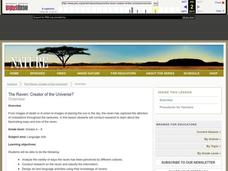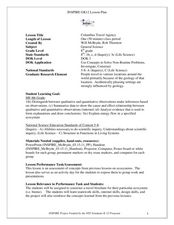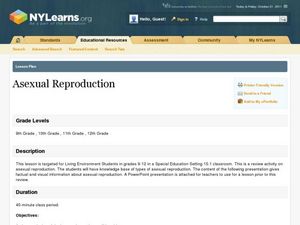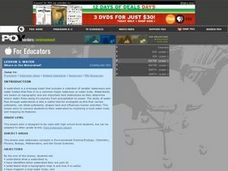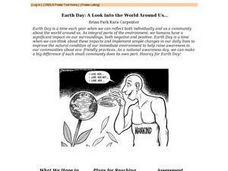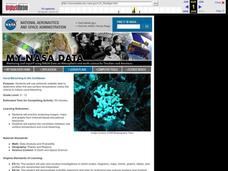Curated OER
Photosynthesis
Seventh graders investigate a multidisciplinary unit with an emphasis in using technology in order to engage them. The students perform Internet research about photosynthesis with a written assessment taken from the WebQuest.
Curated OER
The Raven: Creator of the Universe?
Students explore biology by researching birds in class. For this raven identification lesson, students utilize the Internet to identify the anatomy, habits and habitat of ravens. Students write descriptive paragraphs about ravens and...
Curated OER
Alzheimer's Disease
Investigate Alzheimer's disease. Conduct research using a variety of resources, obtain information, and input the data into a Microsoft Excel spreadsheet. Identify trends in the data and categorize them for an audience.
Curated OER
Skeletal System Crossword
In this biology worksheet, students answer 14 questions related to the skeletal system using an interactive crossword puzzle.
Curated OER
Columbus Travel Agency
Eighth graders research about their chosen ecosystem. In this life science lesson, 8th graders play the role of travel agents and create a travel brochure. They share this in class.
Curated OER
Totem Transformations
Students are introduced in the Humanities class, as they explore the origins of Totems in Native American folklore. In the computer lab, students read Totem stories and explore the meaning and symbolism behind the myths using various Web...
Curated OER
Life's Greatest Miracle
Young scholars study/identify the effects of maternal consumption of alcohol at various stages of pregnancy. They study how a developing embryo needs a certain environment to evolve into a healthy fetus and healthy baby. They use the...
Curated OER
Asexual Reproduction
Sixth graders investigate how asexual reproduction produces single-parent offspring. They use plants and yeast to demonstrate vegetative propagation and budding in a laboratory. Students draw five different types of asexual reproduction.
Curated OER
Sun Seeking Plants
Pupils investigate the story "The Tiny Seed" by Eric Carle. This story is used to introduce the children to the concept that seeds change and grow into plants when conditions in the environment including temperature, light, water and...
Curated OER
Water Ways Lesson Plan #1: Who Catches Your Fish?
Students explore the types of fish caught in the Mid-Atlantic region. In this fishing lesson plan, students learn about fishing methods and meet fishermen that catch the fish. Using the water ways website, students research types of...
Curated OER
Water: Where in the Watershed?
Students become connected to their watershed by exploring a local water body and mapping its features. They focus on how the local watershed fits into the larger scheme of the watershed.
Curated OER
Putting Anthrax in History
Students identify the cause and symptoms for anthrax. They research information and summarize it into organized ideas. They evaluate the credability of websites as well.
Curated OER
Earth Day: a Look Into the World Around Us
Pupils develop an artwork made entirely out of recycled materials to exhibit during an Earth Day celebration. They participate in a lecture discussion on the history of Earth Day and environmental issues, do internet research on a...
Curated OER
Folic Acid Health Campaign
A prewriting prompt, a class discussion, a website visit and accompanying worksheet, and a culminating group project make up this lesson plan on public health awareness. The topic is folic acid and how its absence in the diet may...
Curated OER
Cave Painting in the Ice Age
Students take notes and sketch during the Internet research. They take notes of the colors found in the cave paintings (black, browns, ochre, sienna). They create an initial full size comprehensive sketch on scrap paper and in their...
Curated OER
Survival in the Open Ocean
Students examine how scientists conduct pelagic research and identify pelagic predators as they study the open-ocean ecosystem. They discuss and conduct small group research of this environment in order to produce a presentation.
Curated OER
STS Biology - Teaching Controversial Topics
Each of the three activities submitted presents difficult science topics in the context of the human experience. The activities focus on real-world problems, which have science components, from the students' perspectives.
Curated OER
Coral Bleaching in the Caribbean
Students use authentic satellite data on the NASA website to determine when the sea surface temperature meets the criteria to induce coral bleaching.
Curated OER
Animated Video Productions - Life Cycles
Seventh graders compare/contrast the life cycles of free-living organisms to that of parasites. They conduct Internet research, illustrate the stages of a specific organisms's life cycle, and direct and produce a mini-video production.
Curated OER
Neurology Lessons
High schoolers create a model of a neuron using household items. They bring these items to school for model construction. Students utilize the Internet and other sources to categorize assigned chemical/neurotransmitter. They also...
Curated OER
Learning the Structure and Function of DNA
Students read about Humane Genome Project, examine structure and function of DNA, and participate in gel-electrophoresis lab. They complete Internet activity to test their knowledge of DNA.
Curated OER
What is the purpose of Karyotyping?
High schoolers explain how karyotyping is used to diagnose specific genetic disorders. They use karyotypes to make observations and analyze chromosomal errors. This activity can be completed online or without computer access.
Curated OER
Endangered Species Problem
Young scholars list the morphological characters used to identify the cacti in the field, and describe the associated problems in using these characters for identification. They draw the geographical ranges of the varieties of species...
Curated OER
Around-The-World-Zoo
Junior biologists design and maintain a website about a zoo by researching, classifying, and providing the correct habitats for the animals they choose to have in their zoo. This technology-based project can last over an entire semester...



